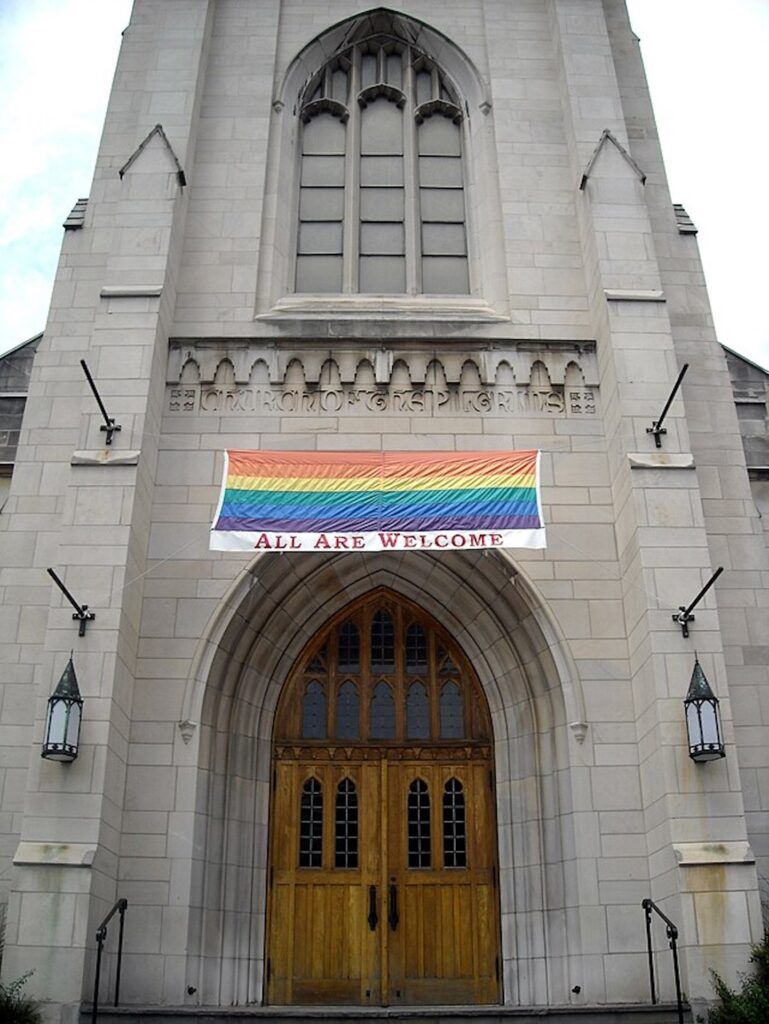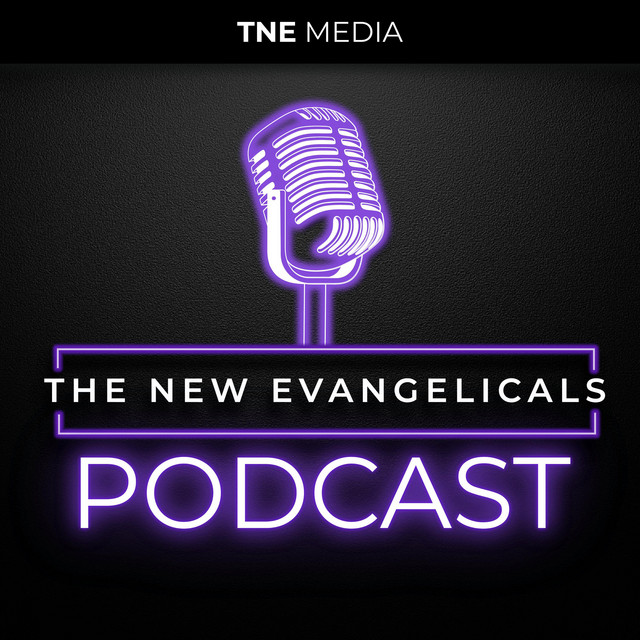The Evangelicals Trying to Distance Themselves from MAGA
Evangelical communities fighting to take back their faith

(Image source: Wikiward)
The irony was not lost on Claudia Oxley, a member of First Covenant Church Minneapolis, that their congregation’s desire to spread God’s word was the reason their evangelical denomination expelled them in 2019. Oxley tells The Revealer things did not bode well for their church when they began seeking to recruit members who looked and lived differently from them. “We saw ourselves as a primarily white congregation in the middle of the city, while the area itself is truly diverse,” she says. “We took action to promote a more inclusive membership.”
The leadership at First Covenant had internally wrestled with how to promote diversity, from race to sexuality, including publicly supporting marriage equality. “We were really finding our way to simply honor our values, which were to love God and to love all,” Oxley says. But the Evangelical Covenant Church, First Covenant’s governing denomination, found what they were doing upsetting. As a result, First Covenant was voted out of the association despite being one of its three founding U.S. congregations.
The church would most likely resume its affiliation with the Evangelical Covenant Church tomorrow, says Oxley, if the denomination embraced teaching Christianity to all neighbors. But over the past decade, the Evangelical Covenant Church has become increasingly and rigidly conservative.
Some scholars of religion, such as Barry Hankins, Professor of History at Baylor University, believe that Donald Trump and the MAGA movement are responsible for turning evangelical communities into a political vehicle. For this reason, many evangelicals are abandoning the title altogether.
“I used to be able to say I was an evangelical,” Hankins tells The Revealer. “I can’t anymore. MAGA evangelicals have, for all public purposes, succeeded in completely redefining what evangelicalism means in America.”
The professor says the most ironic aspect of MAGA wielding evangelism as both a sword and shield for its policies is that most evangelicals initially opposed Trump as the Republican nominee in 2016 for the same reasons others continue to criticize him today, including—but not limited to—his lack of Christian character and morals. Hankins says that after Trump secured the Republican nomination, most evangelicals supported him solely because they have always voted Republican regardless of circumstances.
Hankins believes the rise of fully committed MAGA evangelicals is a result of the Republican Party weaponizing culture wars to make them feel as though they are persecuted and in need of a savior in this world. He explains that this discourse has been unfolding since Barack Obama’s presidency, when some church leaders accused Obama of waging war on religion and turning the country too secular. Trump has used the narrative of persecuted Christians to his advantage, Hankin says, reshaping the Christian right with evangelicalism at its center. The motif of evangelicals—and America—being under siege has grown stronger and stronger, pushing Trump’s supporters to tolerate behavior that some argue is at odds with how Christians should treat one another.
Hankins believes the perception of evangelicalism today, especially among progressives, is that it is a faith willing to support a fascist authoritarian to protect itself. As someone who has taught about the rise of fascism for over 40 years, he says this is indeed exactly what it looks like. What concerns him most about MAGA evangelicals is that they conflate the word of Jesus with the president’s while ignoring all the ways the two men contrast. He thinks the damage that has been done won’t be fixed by anything short of revivalism, which would be sparked by fervent interest in new ideas about religion.
As his second term approaches the end of its first year, Trump has raised the stakes on persecuting thy neighbor by sending troops into his own country to quell protests and targeting undocumented immigrants with particular cruelty, with children and U.S. citizens being caught up in military-style ICE raids. SCOTUS even lifted a ban on racial profiling to allow ICE to target Latin people based on physical appearance and speaking Spanish. Trump has gone as far as pushing to involuntarily commit homeless people to psychiatric hospitals in an effort to keep them off the street, or have them face jail time. So far, MAGA evangelicals remain steadfast in supporting these actions, at least through their continued allegiance to the Republican Party. The closest issue that nearly caused a rift with evangelicals was Trump’s close ties with convicted child sex trafficker Jeffrey Epstein and the multiple rape allegations that stemmed from it.
Some evangelicals, though, are trying to practice their faith in ways that seem at odds with the MAGA movement. Hankins’ church, for examples, engages in a common philanthropic Christian initiative: helping to shelter and feed refugees. “We have a house where we can accommodate maybe four or five families at a time while they’re going through their paperwork and stuff,” Hankins says. “It’s usually mothers with children who come from Mexico.” Of course, under the current Republican regime, the very people these churches dedicate themselves to protecting are the ones most at risk. “MAGA Evangelicals have been willing to put aside what they used to argue, which was that you had to have Christian morality to be a good president,” says Hankins.
As a result, many evangelicals feel their support for marginalized communities means they must abandon ties to evangelicalism. One only needs to look at TikTok to see how the politicization of religion is creating lasting divides within church communities. This year saw a trend of TikTokers sharing their personal journey quitting their churches because of social issues like abortion rights, LGBTQ rights, racism, immigrant rights, and a general divide on what constitutes basic human decency. Jerad Morey, director of strategic relationships at the Minnesota Council of Churches, says the situation reminds him of when author Anne Rice famously converted to Christianity—only to declare a few years later that she was no longer Christian. Rice clarified that she still believed in and followed Jesus, but she didn’t want to be identified with other Christians who were using the religion to justify behaving in problematic ways.
For Morey, the way forward begins with understanding that evangelicalism is not a monolith. There are organizations, like the National Association of Evangelicals, but they aren’t gatekeepers of the faith itself. There are so many different networks and individual congregations that identify as part of evangelicalism, but they aren’t in a strictly accountable relationship to each other. While leaving this specific branch of Christianity is one option, building an evangelical community in the spirit of tolerance for all of humanity is another.
“Group identity is a complex thing because you’re thinking about your own values and how they line up with the values of the group,” says Morey. “When you commit to a faith, it usually follows a moment of powerful conviction, a deep connection with the divine. The question then becomes: how much of that conviction comes from scripture, how much from culture, and how much from my lived relationship with God?”
Morey says many faith organizations that actively support marginalized communities avoid press interviews or publicizing their work in order to protect the people they serve. “Many churches have posted ‘private property’ signs to establish a legal basis for requiring a warrant on their campuses outside of public worship hours,” he says.
While some evangelicals have chosen to leave evangelicalism behind because of their distaste with the faith’s support of MAGA, others are following Hankin’s suggestion of revivalism.
Malynda Hale, an American singer, actress, and political activist, tells The Revealer that she didn’t realize being an evangelical could even be seen as a bad thing until she reached college. Since Black Americans were historically excluded from white evangelical churches, she grew up in the African Methodist Episcopal Church, which preached love for all her neighbors. “I went to a conservative evangelical college, and that’s when I was really exposed to the negative side of Christianity and evangelicalism. I wasn’t even aware of what fundamentalism was, or how people viewed women, other races, and sexualities,” she says.
Knowing there was a better way emboldened her to fight against the current, no matter how strong it seemed. As a singer, she released a song called “God and His Gun” in 2022, which called out white Christian nationalists. A friend suggested she tag the Instagram handle of a new digital nonprofit he thought would resonate with her called The New Evangelicals. Hale says she never expected to go on their podcast and eventually become their executive director.

(Image source: Spotify)
The New Evangelicals was founded by Tim Whitaker in 2020. He tells The Revealer his inspiration came from all the ways evangelicalism disappointed him. Donald Trump getting the majority of evangelical support was the proverbial nail in the coffin, he says. “Evangelicals today are not doing it right,” he says. “They’re bringing bad news. They’re bringing hell on Earth to their neighbors. So I think the term is worth reclaiming for that reason alone, also because its history does have some really bright spots in it.”
Whitaker wanted to create an online community for evangelicals who refused to believe their faith came at the price of ethics and morals. He brought the knowledge of a long legacy of positive evangelical civic engagement, including the early Wesleyan abolitionists. Evangelicals were also among the first people to ordain women in America through Oberlin College. The New Evangelicals’ mission is simple: “Through educational resources and inclusive community spaces, we empower people to reject Christian Nationalism and boldly advocate for their neighbors—while holding onto a faith rooted in the way of Jesus: with love, justice, and compassion for all.” With 194k followers on Instagram and 144k on TikTok, it’s safe to say their message is finding an audience.
“I like letting evangelical fundamentalists know they don’t own the term,” says Whitaker. “Evangelicalism doesn’t belong to MAGA or Donald Trump. They can’t do a damn thing about the fact that we’re using the term evangelical and flipping it on its head, and, dare I say, tapping into a largely unknown side of the term. New Evangelicals are fully inclusive. We fight for our queer neighbors. We want all of our immigrant neighbors to be here, to be out of the shadows, and to get access to the benefits that America can offer them.”
Jamie Valentino is a journalist and essayist published in over 100+ newspapers and magazines.